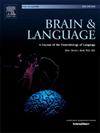Differential effects of working memory constraints on syntactic and semantic processing: Evidence from ERPs
IF 2.3
2区 心理学
Q1 AUDIOLOGY & SPEECH-LANGUAGE PATHOLOGY
引用次数: 0
Abstract
Working memory (WM) is essential for language comprehension. It enables us to retain and manipulate information, track context, and recall key details. While WM’s role in syntactic processing is well-established, its impact on semantic processing is less clear.WM resources are allocated based on task demands, with syntactic processing—requiring the maintenance and manipulation of hierarchical dependencies—placing higher demands on WM. The present study uses electroencephalography (EEG) to examine how WM constraints impact syntactic and semantic processing. Monolingual English speakers completed a Sentence Judgment Task (SJT). Participants were assigned to two groups: the NonMemory group completed the SJT alone, while the Memory group performed a dual-task version requiring them to memorize a sequence of three words and monitor the sentences for these words. Event-related potential (ERP) results reveal a diminished P600 effect for syntactic violations in the Memory group, suggesting reduced sensitivity to syntactic errors under WM constraints. In contrast, no significant group differences for the N400 were observed for semantic violations, indicating that semantic processing may be less affected by WM limitations. This study advances our understanding of the role of WM in language processing and highlights how WM constraints differentially impact syntactic vs semantic processing. Insights from this research can inform how the brain adapts to varying WM demands, such as in second language processing, where prioritizing semantic over syntactic processing may be necessary to optimize limited cognitive resources.
工作记忆限制对句法和语义加工的差异影响:来自erp的证据
工作记忆(WM)对语言理解至关重要。它使我们能够保留和操作信息,跟踪上下文,并回忆关键细节。虽然WM在句法处理中的作用是公认的,但它对语义处理的影响却不太清楚。WM资源是根据任务需求分配的,语法处理(需要维护和操作分层依赖关系)对WM提出了更高的要求。本研究使用脑电图(EEG)来研究WM约束如何影响句法和语义加工。单语英语者完成一个句子判断任务(SJT)。参与者被分为两组:非记忆组单独完成SJT,而记忆组执行双任务版本,要求他们记住三个单词的序列并监控这些单词的句子。事件相关电位(event - correlation potential, ERP)结果显示,记忆组对语法错误的P600效应减弱,表明WM约束下对语法错误的敏感性降低。相比之下,N400在语义违规方面没有显著的组间差异,这表明语义处理可能受WM限制的影响较小。本研究促进了我们对语言处理中WM作用的理解,并强调了WM约束对句法和语义处理的不同影响。这项研究的见解可以告诉我们大脑是如何适应不同的WM需求的,比如在第二语言处理中,优先考虑语义处理而不是句法处理可能是优化有限认知资源所必需的。
本文章由计算机程序翻译,如有差异,请以英文原文为准。
求助全文
约1分钟内获得全文
求助全文
来源期刊

Brain and Language
医学-神经科学
CiteScore
4.50
自引率
8.00%
发文量
82
审稿时长
20.5 weeks
期刊介绍:
An interdisciplinary journal, Brain and Language publishes articles that elucidate the complex relationships among language, brain, and behavior. The journal covers the large variety of modern techniques in cognitive neuroscience, including functional and structural brain imaging, electrophysiology, cellular and molecular neurobiology, genetics, lesion-based approaches, and computational modeling. All articles must relate to human language and be relevant to the understanding of its neurobiological and neurocognitive bases. Published articles in the journal are expected to have significant theoretical novelty and/or practical implications, and use perspectives and methods from psychology, linguistics, and neuroscience along with brain data and brain measures.
 求助内容:
求助内容: 应助结果提醒方式:
应助结果提醒方式:


